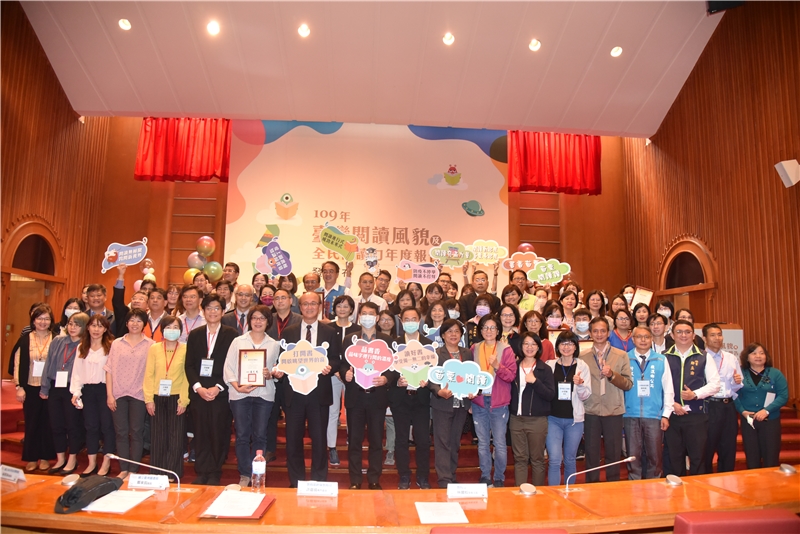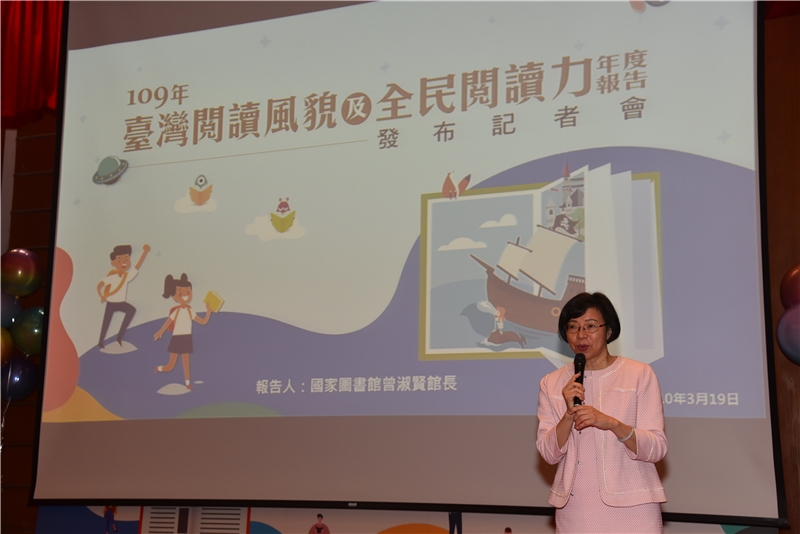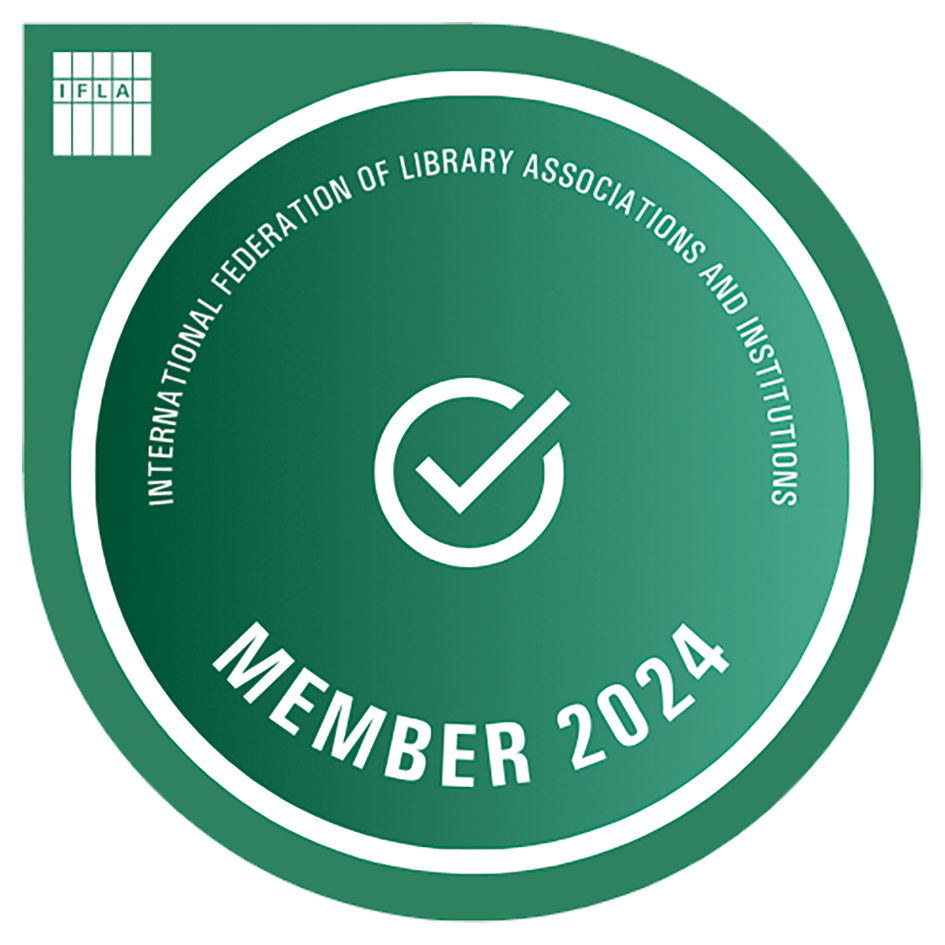News & Events
- 2021-03-31

The Ministry of Education (MOE) has announced the “2020 Annual Report on Reading Atmosphere and Reading Engagement in Taiwan”. This report aims to analyze the public’s reading engagement and reading interests in 2020, as well as identify the books most often borrowed from national public libraries. Utilizing library operation statistics, this analysis was carried out on public reading engagement, and cities with outstanding performances were commended.
In 2020, while the epidemic threat affected people’s lives a lot, various precautions and prevention measures were undertaken all over the country; thus, various indicators about Taiwan people's reading engagement of the year were obtained, with some showing decreasing tendencies and others showing rising tendencies. During the epidemic prevention period, the number of people recorded as visiting libraries throughout the year still maintained a high level which was 79.69 million. The total count of books borrowed during the year was 22.2 million. Statistics show that as many as 80.15 million books and materials had been borrowed and used (compared with 2019, when the total number of visits to libraries decreased by 35.12 million, a decrease of 30.59 percent; the total number of people borrowing books decreased by 750,000, a decrease of 3.27 percent; the total number of books borrowed decreased by 1.15 million, a decrease of 1.41 percent). It is noticeable that despite the impact of the epidemic concerns, library cardholders increased by 1.5 million in 2020, raising the total number of cardholders across the country to 18.39 million, which was an increase of 8.88 percent in comparison to 2019. E-books reading also showed an increasing tendency during the epidemic prevention period. In 2020, the total number of e-books borrowed reached 3.63 million copies, showing a substantial increase of 1.08 million copies. The increased rate was as high as 42.35 percent.
In looking at overall reading interests in 2020, language and literature works continue to be loved by the public; books on history and geography showed a slightly declining tendency. Perhaps this is related to the impact of the epidemic, which affects people by reducing demand for the borrowing of travel-themed books. It can be seen from the book borrowing list that the public has a wide range of reading interests, and that the most popular topics of the year included history, humanities, psychology, inspirational philosophy, business, finance and self-growth, etc., reflecting the diverse reading interests of the public.
In terms of reading engagement, “Cities with Outstanding Overall Reading Engagement” saw Taipei City, Miaoli County, and Taitung County topping their respective categories; “Cities with Greatest Improvement in Reading Engagement” included Taoyuan City, Chiayi County, and Penghu County in their respective categories. In addition, “Cities with Outstanding Reading Engagement in Each Category” showed that the people in Sanwan Township, Miaoli County were the most active borrowers of library books, with each person borrowing on average 20.65 volumes. Sanwan has held this honor for the last 7 consecutive years. The people of Taitung City go to libraries the most, with each citizen visiting an average of 5.55 times every year. Over 80% of people in Taipei and Keelung have library cards, which is the highest percentage in Taiwan. The people in Lienchiang County own the most books; the average is 10.98 volumes per person which is the highest in Taiwan.
The MOE announced the information on public reading engagement and reading interest in Taiwan for 2020, as well as the most borrowed books in national public libraries. The report also analyzed the public’s reading engagement and commended the top performing and the top improving cities based on multiple indicators, thereby helping to highlight the government’s long-term efforts and achievements in reading promotion. In order to continuously cultivate and foster an atmosphere of “loving to read” for the public, books appear to be the spiritual food of the whole population during the epidemic prevention period, and the MOE will invite city and county libraries to recommend people who actively participate in library reading events and who are passionate about reading to share the good books they have read before and to express happiness and warm feelings about reading that can act as a benchmark for encouraging the public to learn more and build a society of active readers. It is certain that in the future, the MOE will continue to support libraries to enrich their resources, and to assist their creative services so as to ensure the sustainable development of libraries. Such support is definitely a strong back-up force for libraries to improve and enhance their service quality and effectiveness. The MOE will continue to collaborate with counties and cities in maintaining and promoting the development of our nation's public library business, and move forward with the goal of enhancing the reading literacy of the citizens and the quality of library services, which will fulfill the goal of strengthening the nation's soft power.
-
 Group photo of all distinguished guests at the Press Conference for 2020 Annual Report on Reading Atmosphere and Reading Engagement in Taiwan
Group photo of all distinguished guests at the Press Conference for 2020 Annual Report on Reading Atmosphere and Reading Engagement in Taiwan -
 Opening Remarks from Administrative Deputy Minister of Ministry of Education, Teng-Chiao Lin
Opening Remarks from Administrative Deputy Minister of Ministry of Education, Teng-Chiao Lin -
 NCL Director-General Tseng delivers a presentation for 2020 Annual Report on Reading Atmosphere and Reading Engagement in Taiwan
NCL Director-General Tseng delivers a presentation for 2020 Annual Report on Reading Atmosphere and Reading Engagement in Taiwan
- Resources
- NEWS & Events
- ABOUT NCL
- International Cooperation and Exchange
- Services






